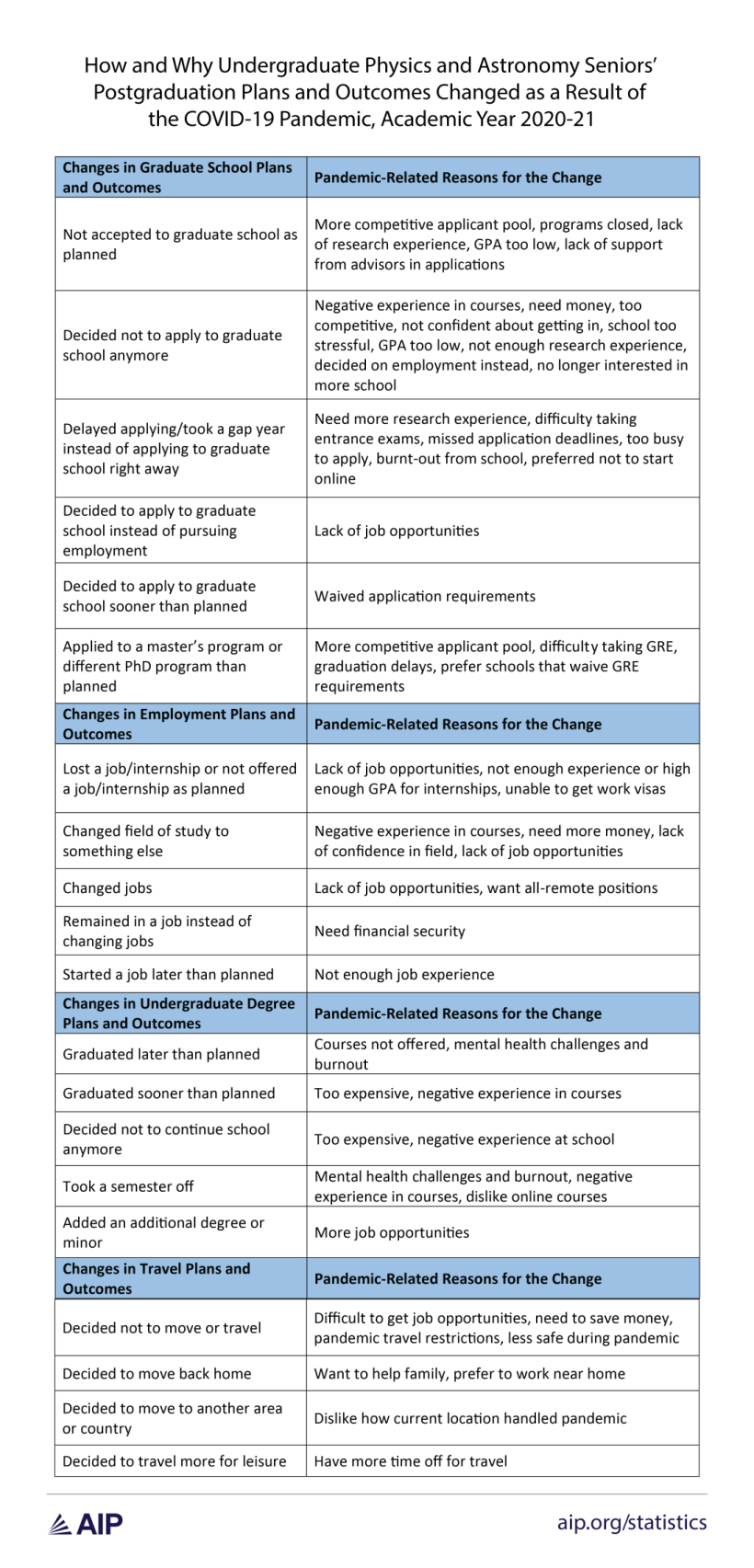Postgraduation Planning During a Pandemic: Effects of COVID-19 on Physics and Astronomy Seniors’ Career Paths
In this report we explore how and why undergraduate students’ career and education plans changed as a result of the COVID-19 pandemic. We found that when students changed their plans, they were more likely to pursue employment instead of graduate education. Students reported that their plans changed due to not being accepted into graduate school, feeling unprepared to apply, or losing interest in applying. Students also adjusted their plans centering around employment outcomes, travel, and their undergraduate degree. A regression analysis showed that several factors impacted student plan changes. Students were more likely to change their plans if they experienced financial strain, loss of internship/job opportunities, graduation delays, less university support, and if they identified as Asian or Asian American. Universities, departments, and faculty members can use these findings and recommendations to recognize where additional student support may be needed, to help students achieve their career aspirations. Additionally, this report includes data on students’ postgraduation outcomes a year later. The majority (77%) of student outcomes were consistent with their original plans to attend graduate school or seek employment. Students who had different outcomes a year later were more likely to switch from graduate study to employment.
Typically, students earning bachelor’s degrees in physics and astronomy follow one of two paths: they immediately pursue graduate studies, or they enter the workforce. The decision about which path to follow is often solidified during a student’s senior year of study. These students are developing and sending out resumes to prospective employers or taking GRE exams and submitting applications to graduate programs, or possibly pursuing both options.
In our survey, undergraduate seniors in physics and astronomy reported the COVID-19 pandemic had a substantial effect on their experiences. Courses transitioned to online learning environments. Meanwhile, many students lost access to research equipment and labs, were unable to complete final projects, felt burnt-out and isolated, and had fewer opportunities to interact with faculty members and fellow students. With all these pandemic-related stressors happening in their senior year, many undergraduate seniors re-evaluated their post-degree career and continuing education plans.
When we asked undergraduate seniors about their postgraduation plans, more than one-third (36%) reported their plans changed because of the COVID-19 pandemic[1]. Figure 1 compares the aspirations of seniors whose plans did and did not change. Those who changed their plans were more likely to pursue employment after graduating or remained undecided about the next step in their career path. We have not asked about changes in plans on previous questionnaires, so we cannot know the true extent to which the changes are COVID-driven or are simply typical behavior.
Figure 1

What Seniors Say About Changes in Plans
In an open-ended question, we asked the 36% undergraduate seniors whose plans changed to elaborate on how and why these changes occurred as a result of the Covid-19 pandemic. We learned that the disruptive nature of the pandemic influenced seniors’ post-degree aspirations in a variety of ways (Table 1).
There were various reasons given for these decisions, including increased applicant competition for graduate school admissions, financial strain, lack of employment opportunities, Covid-19 restrictions, graduation delays, decreased self-confidence, and poor experiences in online courses. We classified the reasons into four areas of change: graduate school plans and outcomes, employment plans and outcomes, undergraduate degree plans and outcomes, and travel plans and outcomes.
Table 1

Quantitative Predictors of Seniors’ Change in Plans
We further explored the possible reasons for these postgraduation plan changes using quantitative analyses. We ran a logistic regression to see which demographic, academic, and financial factors predicted a change in postgraduation plans or outcomes (Table 2). Paralleling many of the reasons described in the open-ended responses, postgraduation plans were more likely to change if seniors were worse off financially, lost or postponed career opportunities, delayed graduating, and were less satisfied with their university’s services during the pandemic (e.g., mental health assistance, disability accommodations, Covid-19 testing, living accommodations, IT support).
We did not see any significant effects based on seniors’ experiences with their departments, physics professors, or physics courses. Although the role of departments and courses was mentioned in the open-ended responses, the regression results show that they were not the driving factors in changing postgraduation plans or outcomes when controlling for other factors in statistical models.
Of the demographic variables, only students who identified as Asian or Asian American were more likely to have their plans change due to covid-19. In follow-up analyses, we found that students who were Asian or Asian American were more likely than students from other race/ethnic groups to say they lost a research, internship, or job opportunity during Covid-19.
Table 2

Where Are the Physics and Astronomy Seniors A Year Later?
The American Institute of Physics conducts an annual follow-up survey of physics and astronomy bachelors. Using the results of this survey we were able to compare the postgraduation plans of students who were seniors during 2020-2021 academic year with their actual postgraduation outcomes (Figure 2).
Over three-quarters (77%) of seniors had actual post-graduation outcomes that matched the post-graduation plan they had while a senior. For the 23% of seniors whose outcomes a year later did not match their original plans, the data show the predominant shift was from graduate study to employment. The majority of the students who indicated they were undecided concerning their postgraduation plans while they were a senior ultimately entered the workforce or were seeking employment a year later.
The follow-up survey did not ask why students’ outcomes did not match their postgraduation plans while they were a senior in college.
Figure 2

Implications and Future Actions
A typical senior year for a physics or astronomy major can be a difficult and stressful time under normal circumstances. With the additional social and education complexities that the Covid-19 pandemic introduced, it is no wonder that one-third of undergraduate seniors changed their post-degree plans as a direct result of pandemic influences. Our findings show that when these plans changed during Covid-19, seniors were more likely to seek employment instead of graduate school in physics or astronomy. This is because seniors were not accepted to their preferred graduate program, could not afford it financially, no longer wanted to be in school, were suffering from burnout and mental health symptoms, or did not feel confident applying with their level of research experience and physics GPA. While COVID-19 may have affected some students’ plans, most people’s outcomes were consistent with their plans as a senior.
We also found that seniors who were Asian or Asian American were more likely than seniors from other race/ethnic groups to change their postgraduation plans. Our findings are limited in this study, and we are unable to fully explain the reasons for this difference. We encourage departments and faculty members to further explore and understand the experiences of these students.
Helping students remain on their desired career path is a complicated and multifaceted challenge for physics departments and faculty members to address, and it can be helpful to know where a department’s time and resources could have the most impact. Our results show that the following factors influence career plan changes the most and could have the most impact when helping students achieve their intended career goals:
- Financial assistance to complete undergraduate degrees and attend graduate school if desired
- Department and advisor support to graduate on time
- Research, internships, and job opportunities
- Institutional policies and structures that provide support for technology issues, mental health resources, and accommodations for disabilities and extenuating life circumstances
Additional Resources
Further data from this survey addressing the student’s perceptions of the COVID-related social dynamics of their department can be found in a Physics Today article, “Undergraduate Physics in the Age of COVID-19,” https://physicstoday.scitation.org/do/10.1063/PT.6.5.20211102a/full/ . The article highlights differences by race and gender for different social influences students encountered as a result of the Covid-19 pandemic, including confidence levels, sense of belonging, and departmental support.
EP3 Effective Practices for Physics Programs, a collaborative effort of The American Physical Society and American Association of Physics Teachers , is an excellent resource for departments looking to reevaluate how they support their students and to explore which additional efforts they may want to consider implementing. EP3 provides actionable steps on how to implement systematic departmental improvements (see https://ep3guide.org/ ).
Methodology
Each fall the Statistical Research Center conducts the Survey of Enrollments and Degrees. This survey asks physics and astronomy departments to provide information on the number of students enrolled and the number of recent degrees conferred the previous academic year. This survey also asks for the names and emails of current senior-level students and recent degree recipients. In the spring of 2021 this contact information was used to conduct a survey of physics and astronomy seniors.
In the fall of 2020 departments reported enrollments of approximately 15,200 senior-level physics and astronomy majors. We received contact information for about 10,000 of these students. In the spring of 2021, seniors were emailed up to four invitations to participate in the survey. We received responses from over 2,100 students and included 1,823 students in the analysis for this report.
In the fall of 2021 departments provided the names and contact information for their physics and astronomy bachelors in the class of 2021. These bachelors were asked to complete a degree recipient follow-up survey in February of 2022. We were able to match up the responses of 725 individuals who responded to both the senior survey and the follow-up survey. It is these individuals that are presented in Figure 2 of this report.
For the regression analysis, some variables were created by calculating an average across multiple items. “Frequency of access to academic resources” was 11 items, “satisfaction with university services” was 12 items, “support from physics and astronomy departments” was 5 items, “support from physics professors and students” was 4 items, “confidence in succeeding in physics courses” was 3 items. “Perceived belonging in physics courses” and “confidence learning in online courses” were each 1 item.
We thank the many physics and astronomy departments for providing their senior’s and bachelors recipients contact information and the seniors and bachelors who contributed their experiences via our surveys.
e-Updates
You can sign up to receive email alerts that notify you when we post a new report or resource. Visit https://www.aip.org/subscribe-statistics-e-updates to sign up. We will send you an e-Update only when we post something new. You should receive no more than 20 messages in a year.
Follow Us on Twitter
The Statistical Research Center is your source for data on education, careers, and diversity in physics, astronomy, and other physical sciences. Follow us at @AIP_Stats.
How the Pandemic Changed Postgraduation Plans for Seniors Majoring in Physics and Astronomy
By Anne Marie Porter and Patrick Mulvey
October 2022
A product of the Statistical Research Center of the American Institute of Physics
1 Physics Ellipse, College Park, MD 20740
stats@aip.org | 301.209.3070 | aip.org/statistics
Footnotes
[1] We asked students “Have your post-degree plans changed as a result of the COVID-19 pandemic?” Students could answer yes or no.


